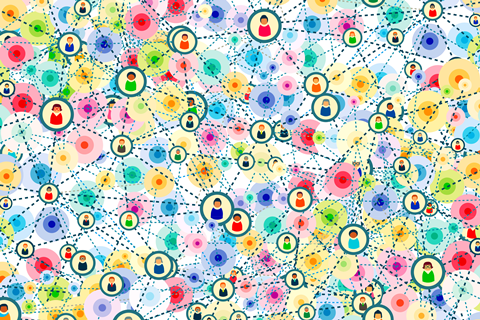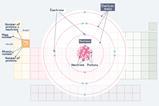Niki Kaiser reflects on the networks that have been vital in her career and suggests ways even the most reluctant networker can start making new contacts

Whenever I see the word ‘networking’, a little bit of me curls up inside and whimpers! I do still get nervous before meeting new people.
So, when I was unexpectedly invited to attend the Royal Society of Chemistry President’s Dinner last year to discuss effective teacher CPD, I was apprehensive. However, I thoroughly enjoyed it, met some interesting people, and learned a lot. I also felt able to make a decent contribution to the discussion. This experience gave me the confidence to stand (successfully) for election to the RSC Education Division Council, and I’m hoping to make a real contribution to chemistry education via this network. For me, this chain of events demonstrates the power of networks, and just how worthwhile it can be to take a deep breath sometimes and doing things that don’t feel easy.
In fact, a range of networks have let me build relationships with a wonderful variety of people. These people have supported me in many ways.
I’ve embraced the virtual
Many of my networks exist primarily online, including #CogSciSci, an active peer-support forum (bit.ly/CogSciSciMail), with over 200 members who regularly share ideas and resources for applying cognitive science to science teaching. Members of #CogSciSci give me constant food for thought, and have helped me turn abstract, research-based ideas into concrete classroom strategies.
Many of my networks exist primarily online, including #CogSciSci, an active peer-support forum, with over 200 members who regularly share ideas and resources for applying cognitive science to science teaching. Members of #CogSciSci give me constant food for thought, and have helped me turn abstract, research-based ideas into concrete classroom strategies.
#CogSciSci originated on Twitter, and I find the ‘Edutwitter’ community supportive and full of useful advice. One of my first points of contact was @RSC_EiC, who share interesting articles for chemistry educators. They are generous in their support of all users, not just the more established people. When they shared one of my early blogposts about threshold concepts, it gave me a huge confidence boost, and triggered a variety of helpful conversations.
Online networks have been particularly valuable in allowing me to juggle home and school life. I am grateful when people live-tweet from meetings that I’m unable to attend, and online conference sessions make this even easier. Last year, I submitted an e-poster to the Royal Society of Chemistry Methods in Chemical Education Research (MICER) conference, which meant I still benefited from some very helpful feedback despite being unable to get there.
… And the face-to-face
Having said that, I’m looking forward to attending MICER in person this year, because there is no substitute for face-to-face conversations. This is also why our school journal club is really important to me. Our monthly lunchtime meetings have helped increase my research literacy, consider others’ viewpoints and widen my reading.
My school is part of the Research Schools Network (researchschool.org.uk), and I have been struck by the spirit of collaboration and shared purpose across the network, even though individual schools are doing slightly different things, and have diverse strengths. The ethos behind this national network is ‘teachers listen to teachers’. I’m convinced the most effective way to help schools become more research-informed is to support them grow and embed the culture from within their own particular context. We have formed a research leads network in Norwich, and we’re proud of the sense of community that is building around it.
My school is part of the Research Schools Network, and I have been struck by the spirit of collaboration and shared purpose across the network, even though individual schools are doing slightly different things, and have diverse strengths. The ethos behind this national network is ‘teachers listen to teachers’. I’m convinced the most effective way to help schools become more research-informed is to support them grow and embed the culture from within their own particular context. We have formed a research leads network in Norwich, and we’re proud of the sense of community that is building around it.
Go for it!
I love connecting with people, but I don’t see myself as an extrovert. It’s only because I’ve developed skills over the years that allow me to be sociable, even when I want to run out of a room screaming, that I have been able to get involved. For anyone who’s experienced reluctance to get networking, like me, I’d suggest three top tips:
1. Don’t be afraid to just get stuck in with online networks and forums. Reply to threads, start new ones, and ask questions.
2. Search Twitter hashtags like #ASEChat and #CogSciSci to connect with likeminded teachers. Many groups have a regular ‘chat time’ you can join.
3. If you are starting up a network of any sort, refer to the Behavioural Insight Team’s EAST framework (Easy, Accessible, Social and Timely) [pdf]: bit.ly/1WaU44B. Consider whether you want your network to be peer-driven or led by a particular person.
3. If you are starting up a network of any sort, refer to the Behavioural Insight Team’s EAST framework (Easy, Accessible, Social and Timely). Consider whether you want your network to be peer-driven or led by a particular person.
If you have the opportunity to attend a networking event, but you’re intimidated by the thought of a room full of people you barely know, keep in mind that you’re probably not the only one. People are generally friendly, and are just looking for a way to start a conversation. So go for it! You never know where it might take you.
A version of this article was first published on norwich.researchschool.org.uk














No comments yet